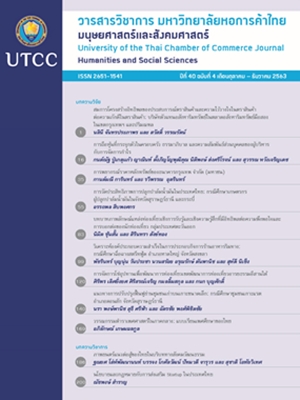Supply Chain Management for Tourism Development of Southern Isan Civilization
Main Article Content
Abstract
This study aims to 1) study the community context and supply chain management of communities with tourism development of Southern Isan civilization, 2) analyze the guidelines and potential of supply chain management; and 3) to develop supply chain management model for tourism development of Southern Isan civilization. This study is a qualitative research which used participatory action research with key informants consisting of community leaders, entrepreneurs and network associates. Data were collected via field surveys, analyzing documents, interview, arranging a forum to analyze community potential and organizing a networking platform. The results found that 1) communities that are capable of being a model of tourism development Southern Isan civilization consisting of 3 communities which are Baan Prasart community, Ton Nam Moon Homestay Baan Suk Somboon, and Baan Khok Mueng community 2) the potential of supply chain management of 3 communities, it was found that the strengths aspect had strong leaders and harmonious members as well as accommodation received Thai homestay standard. The weaknesses aspect had shortage of having a community map and community lacked of knowledge through supply chain management. The opportunity aspect had a network creations opportunity among communities through national resources. The threats aspect had the increasing of new competitors in tourist attractions; and 3) the model of development of supply chain management based on the Supply Chain Operations Reference Model (SCOR Model) enables the model communities to develop supply chain management in historical tourism, ecotourism and cultural tourism. This derived from thinking, planning, decision operation, and evaluation participation of community and network to raising the level of tourism sustainability in tourism development of Southern Isan civilization.
Article Details
ลิขสิทธิ์ของบทความ
ผลงานที่ได้รับการตีพิมพ์ถือเป็นลิขสิทธิ์ของมหาวิทยาลัยหอการค้าไทย ห้ามมิให้นำเนื้อหา ทัศนะ หรือข้อคิดเห็นใด ๆ ของผลงานไปทำซ้ำ ดัดแปลง หรือเผยแพร่ ไม่ว่าทั้งหมดหรือบางส่วนโดยไม่ได้รับอนุญาตเป็นลายลักษณ์อักษรจากมหาวิทยาลัยหอการค้าไทยก่อน
References
กาญจนา สุระ. (2562). การพัฒนาเพื่อยกระดับศักยภาพการจัดการธุรกิจของชุมชนท่องเที่ยวเชิงวัฒนธรรมจังหวัดเชียงใหม่. วารสารวิชาการ มหาวิทยาลัยหอการค้าไทย, 39(3), 106-120.
เกรียงชัย รุ่งฟ้าใหม่, และสรัญญา ศรีทองมาศ. (2562). ความสำเร็จอย่างยั่งยืนของโฮมสเตย์จากมุมมองผู้นำชุมชนโฮมสเตย์ 4 ภูมิภาคของไทย. วารสารวิชาการ มหาวิทยาลัยหอการค้าไทย, 39(4), 89-114.
เขมขนิษฐ์ แสนยะนันท์ธนะ, นันทิ สุทธิการนฤนัย, และ วันชัย รัตนวงษ์. (2555). การประเมินศักยภาพเพื่อสร้างมูลค่าเพิ่มในระบบห่วงโซ่อุปทาน ของอุตสาหกรรมการท่องเที่ยวในประเทศไทย. ใน การประชุมนําเสนอผลงานวิจัยบัณฑิตศึกษา (น.1415 – 1426). กรุงเทพฯ: มหาวิทยาลัยรังสิต, บัณฑิตวิทยาลัย.
คณะกรรมการพัฒนาการท่องเที่ยวประจําเขตพัฒนาการท่องเที่ยวอารยธรรมอีสานใต้. (2561). แผนปฏิบัติการพัฒนาการท่องเที่ยวภายในเขตพัฒนาการท่องเที่ยวอารยธรรมอีสานใต้ พ.ศ. 2559 – 2563. สืบค้นเมื่อ 24 กุมภาพันธ์ 2561, จาก http://www.oic.go.th/FILEWEB/
ชนิศา มณีรัตนรุ่งโรจน์, และ ขวัญกมล ดอนขวา. (2556). การจัดการโซ่อุปทานของสินค้าหนึ่งตําบลหนึ่งผลิตภัณฑ์ ประเภทผ้าไหม. นครราชสีมา: มหาวิทยาลัยเทคโนโลยีสรุนารี.
นิศา ชัชกุล. (2557). อุตสาหกรรมการท่องเที่ยว. กรุงเทพฯ: จุฬาลงกรณ์มหาวิทยาลัย.
บุญเลิศ จิตตั้งวัฒนา. (2555). การจัดการด้านการตลาดอุตสาหกรรมการท่องเที่ยว. กรุงเทพฯ: เพรส แอนด์ ดีไซน์.
พนารัช ปรีดากรณ์. (2556). การพัฒนาธุรกิจการท่องเที่ยวผ่านการสร้างเครือข่ายกลุ่มธุรกิจ. วารสารวิชาการการท่องเที่ยวไทยนานาชาติ, 9(1), 48-67.
พิบูล ทีปะปาล, และ ธนวัฒน์ ทีปะปาล. (2559). การจัดการเชิงกลยุทธ์. กรุงเทพฯ: อมรการพิมพ์.
พิมพ์ระวี โรจน์รุ่งสัตย์. (2553). การท่องเที่ยวชุมชน. กรุงเทพฯ: โอ.เอส. พริ้นติ้งเฮ้าส์.
วรรณดี สุทธินรากร. (2556). การวิจัยเชิงปฏิบัติการ การวิจัยเพื่อเสรีภาพและการสรรค์สร้าง. กรุงเทพฯ: สยามปริทัศน์.
สมศักดิ์ สามัคคีธรรม. (2558). ชุมชน ความเป็นส่วนตัว และการพัฒนาในยุคโลกาภิวัตน์. วารสารพัฒนาสังคม, 17(1), 1-27.
สำนักงานคณะกรรมการพัฒนาเศรษฐกิจและสังคมแห่งชาติ. (2560). แผนพัฒนาเศรษฐกิจและสังคมแห่งชาติฉบับที่ 12 พ.ศ. 2560 - 2564. สืบค้นเมื่อ 17 มิถุนายน 2561, จาก https://www.nesdc.go.th/ewt_dl_link.php?nid=6422
สุภางค์ จันทวานิช. (2557). วิธีการวิจัยเชิงคุณภาพ. กรุงเทพฯ: จุฬาลงกรณ์มหาวิทยาลัย.
Carlock, R. S., & Ward, J. L. (2001). Strategic planning for the family business: Parallel planning to unify the family and business. London, England: Palgrave Macmillan.
Cohen, S., & Rousell, J. (2005). Strategic supply chain management: The five disciplines for top performance. New York, NY: McGraw-Hill.
David, F. R. (2011). Strategic management: Concepts and cases (13th ed.). Upper Saddle River, NJ: Prentice Hall.
Giampiccoli, A., & Kalis, J. H. (2012). Tourism, food, and culture: Community based tourism, local food, and community development in Mpondoland. Culture, Agriculture, Food and Environment, 34(2), 101-123.
Huang, S. H., Sheoran, S. K., & Keskar, H. (2005). Computer-assisted supply chain configuration based on supply chain operations reference (SCOR) model. Computers & Industrial Engineering, 48(2), 377-394.
Maleki, M. R., Moradi, E., & Parsa, S. (2014). Rural tourism as a way to rural development. International Journal of Academic Research, 6(4), 79-84.
Pike, S. D. (2008). Destination marketing: An integrated marketing communication approach. Burlington, MA: Butterworth-Heinemann.
Smith, S. E. ( 1997). Deepening participatory action research. In S. E. Smith, D. G. Willms, & N. J. Johnson (Eds.), Nurtured by knowledge: Learning to do participatory action-research (pp. 173-263). New York: Apex Press.
Tapper, R., & Font, X. (2004). Tourism supply chains. Leeds, England: Leeds Metropolitan University.
Thiengkamol, N. (2005). Strengthening community through developing of a learning network model. Journal of Population and Social Studies, 14(1), 27-46.
United Nations, Department of Economic and Social Affairs. (2010). International recommendations for tourism statistics 2008. New York, NY: Author.
Yılmaz, Y., & Bititci, U. S. (2006). Performance measurement in tourism: A value chain model. International Journal of Contemporary Hospitality Management, 18(4), 341-349.
Zhang, X., Song, H., & Huang, G. Q. (2009). Tourism supply chain management: A new research agenda. Tourism management, 30(3), 345-358.


